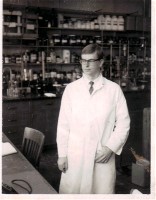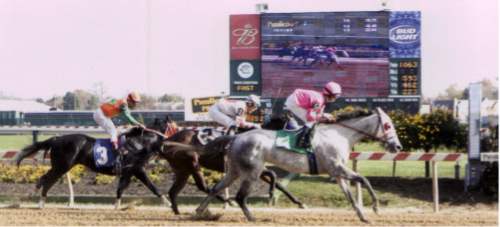“The man I’m looking for
Peter Pugh
doesn’t exist.”
THURSDAY, 15 JULY 2021 15:22
Saratoga Today
Pugh’s Unique Story as a Trainer, Buyer, Seller, and Farm Owner
BY TONY PODLASKI | WINNER’S CIRCLE
Among the larger racing stables on the Saratoga Racecourse backstretch, there are many smaller ones that have a unique background. Peter Pugh is one of those.
Pugh enters his 45th season at Saratoga Racecourse with a variety of roles and experiences that includes an owner, trainer, buyer, and seller.
Like many people in horse racing, Pugh’s interest started with his parents who were fox hunter riders. His father was the captain of the last Calvary at Fort Riley in Kansas during World War II that attracted other horsemen such as the multi- athlete legend Pete Bostwick Jr. and Hall of Fame show jumping rider Bobby Burke.
“When World War II hit, a bunch of horse trainers went there,” Pugh said. “It was something back in those days.”
After working on the backstretch since he was 16 years old, Pugh started training horses in 1976 on the steeplechase circuit in the Mid-Atlantic and Carolina region. He also had horses competing at Delaware Park and Belmont Park.
Pugh eventually came to Saratoga with a couple of horses: War Reason, who gave him his first career win earlier that year at Camden, and Quilapayun. While neither horse finished in the money in their respective starts, War Reason came back a year later to give Pugh his first Saratoga win.
“They had a healthy circuit at those racetracks,” Pugh said. “We would go to Carolina, then to Maryland, Belmont, Delaware Park and Saratoga, and then back to Belmont until near Thanksgiving. During the interim, there would be the hunt meets in the fall and spring with a whole different set of horses. Steeplechase racing was healthy in those days. Saratoga had one every weekday.”
Pugh became more stationary in New York in 2003 when he started training for Happy Hill Farm. Over his career, Pugh was won 141 races for more than $3.1 million with horses that include stakes winner Sun and Shine, as well as multiple winners Roman Reign, Elroi, Lost Without You, Simeon, and Escapist.
While Pugh has trained several horses, he also spent a significant part of his career by purchasing and reselling horses, known as pinhooking, with some success. One of his more successful experiences was Time Bandit in 1997 and 1998.
Pugh purchased Time Bandit as a yearling for $85,000 at the Keeneland September sales. Six months later, he brought the horse to California for the Barretts sales and went unsold. That’s when Pugh decided to train the horse.
After a couple of months of training in South Carolina, Pugh took Time Bandit to Keenelend for his debut. Starting from post 11, Time Bandit got out of the gate quickly and drew away to an easy nine-length victory at 15-1 while covering the 4½ furlongs in 51.98 seconds, which was one of the faster times during the meet.
That victory quickly got the attention of some buyers.
“That afternoon, people were lined up to buy him,” Pugh said. “If you have a two-year-old who shows up at Keeneland in the spring, they bite. They don’t particularly have to win. They just show up to finish second or third.”
Hall of Fame trainer D. Wayne Lukas eventually purchased Time Bandit for Padua Stables. After defeating eventual multiple graded stakes winning sprinter Yes It’s True in the Bashford Manor Stakes, Time Bandit won the Sanford Stakes and finished third in the Hopeful Stakes at Saratoga in 1998.
Today, Pugh has moved from purchasing yearlings to weanlings. While Pugh suggests there are some benefits to purchasing weanlings, he also indicated there are challenges.
“It makes sense to start with weanlings,” he said. “They are younger and probably a littler cheaper than the yearlings. It also gives you a larger time span to sell the horse, but they are harder to tell how they are going to turn out. Sometimes, you look at them and think they may change a certain way, but they don’t.”
One of his remaining weanlings from two years ago is Livingstone, who is by the late Pioneer of the Nile, sire of Triple Crown winner American Pharoah. Pugh bought the Virginia-bred colt for $385,000 for Cherry Knoll Farm at the Keeneland November sale in 2019.
“Those [Pioneer of the Nile] horses are usually big,” Pugh said. “This one didn’t grow. That’s why we didn’t sell him. He’s not small. He’s more like his dam’s sire [Montbook].”
Along with training a small set of horses in Barn 71 near the Oklahoma Training Track, Pugh operates the Skara Brae Stables in Melrose, which is about 20 miles southeast from the track.
The farm was already transformed into a horse development and training facility by the late Gene White, a retired physical education teacher, athletic director and football coach at both the Amsterdam and South Colonie school districts.
White named the century-old property, which was once dairy farm, as White Maple Farm Racing Stable as he owned and trained trotters that competed at Saratoga Raceway. Since taking over the farm, Pugh let the grass grow into the former half-mile dirt track to help train his horses, especially with the recent rainfall.
“The track is good, but we let it go back to turf,” Pugh said. “With that stone dust base, it really built a nice turf course. It handles the rain well.”
After five decades of experience of buying, selling, and training horses, Pugh still acknowledges that horse racing is not an easy sport.
“The whole game is difficult,” Pugh said. “It doesn’t matter how much expertise you may have, you need to get lucky, too.”

